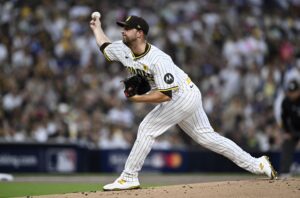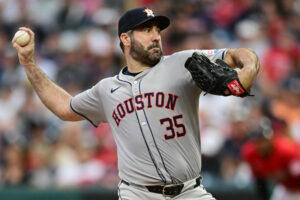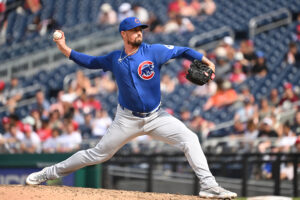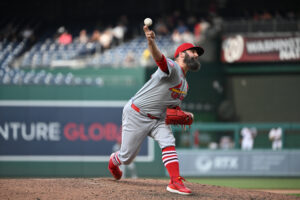The Cincinnati Reds young bullpen didn’t start the season with any flashes of optimism. In fact, the bullpen didn’t start the season being all that young. It was made up of a struggling older group like Jumbo Diaz, J.J. Hoover, Blake Wood, and Ross Ohlendorf. Tony Cingrani was having a rough start, Raisel Iglesias was still a starter, and Michael Lorenzen didn’t make an MLB appearance until June.
The new high-leverage core of Cingrani, Iglesias, and Lorenzen average at 25.7 years old and they have looked impressive in the past few months. So with so many pitching prospects with a wide variety of strengths and weaknesses within the Cincinnati organization, what is the future outlook for the Reds young bullpen?
Work in Progress: The Reds Young Bullpen
The Current Core
Let’s start with Cingrani, since he has spent the most time in the bullpen this season and has the lowest projected ceiling in coming years. A former closer at Rice University, the Reds attempted to convert him into a starter for a few years until his high walk rate and lack of pitch diversity proved too liable.
This year he is the team’s leader in saves at 17 but has had mixed results throughout the season. In 22.1 IP through April and May he had a pedestrian line: a 4.43 ERA, 1.52 WHIP, four saves, with 9.7 K/9, but a horrendous 6.5 BB/9. He found a hot streak in June and July with a 1.90 ERA, 0.97 WHIP, and nine total saves; but has since struggled tremendously with an 8.31 ERA, 2.23 WHIP, and a jaw-dropping 8.31 BB/9.
Iglesias was signed by the Reds to a seven-year, $27 million contract out of Cuba and in 2015 he had a solid year with sixteen starts in eighteen appearances, a 4.15 ERA, 1.14 WHIP, 2.6 BB/9, and 9.8 K/9. This year he has made the transition to the bullpen with just five starts in 32 appearances and has had a fantastic season with a 2.24 ERA, 1.15 WHIP, 3.0 BB/9, and 9.3 K/9.
Lorenzen also began his big league career in the rotation without much luck with a 5.40 ERA and 1.66 WHIP in 21 starts out of 27 games. In 2016, Lorenzen has made all 31 appearances for all 44 IP in relief and has been fantastic with a 2.45 ERA, 1.05 WHIP, with just 2.3 BB/9, and a K/9 of 8.4 up from just 6.6.
Cingrani only really has the arsenal and physical tools to live in the bullpen and, despite flashes of a high peak of performance, he has never really been the Reds’ end all solution for the 9th inning. He is streaky, so despite his pleasant hot streaks, it is more than a volatile question to ask whether there is room for Cingrani among the many young Cincinnati prospect arms a few years down the road.
Iglesias certainly showed plenty of promise as a starter, but the Reds have always had a dream of him as the future closer. His career track record backs up the permanent shift to relief. As a starter he tossed 28.1 IP in five starts with a 3.49 ERA and 1.45 WHIP while as a reliever he has thrown 44 IP with a nifty 1.43 ERA and 0.96 WHIP. Still under contract until 2020 and being owed $20,857,142; the franchise seems to have the full green light for their master plan of seeing Iglesias finish games on a nightly basis.
Lorenzen has also proved himself to be a better option as a reliever. He had a poor stat line as a starter with a 5.45 ERA, 1.69 WHIP, 6.6 K/9, and 4.7 BB/9; yet from the bullpen he owns a 2.79 ERA, 1.08 WHIP, 8.0 K/9, and 2.3 BB/9. He has a slider that has ranged from 83.2-95.7 and averages at 90.5 mph while his fastball travels at an average speed of 95.9 and has peaked at 98.8 mph this season.
Being still quite young at 24, having a successful track record out of the bullpen, and having electric power on his two most frequently used pitches, it is safe to say that Lorenzen has a saved seat in Cincinnati for the foreseeable future.
Still in Limbo
There have been plenty of young guns for the Reds this season who have experienced potent mixes of success, including: Brandon Finnegan, Anthony DeSclafani, John Lamb, Cody Reed, and Robert Stephenson. Finnegan and DeSclafani seem to be safely penciled in as starters.
Finnegan made a durable 30 starts this year so far and averaged 5.6 innings per outing while DeSclafani made 18 starts while averaging 6.20 innings per outing and in 49 total starts as a Red since 2015, he has pitched 296 innings for an average of 6.04 IP per start.
Finnegan has a 4.16 ERA and 1.39 WHIP in 34 career starts; and holds a 2.72 ERA, 1.29 WHIP, and an impressive 9.97 K/9. DeSclafani has a 3.71 ERA, 1.29 WHIP, 2.4 BB/9, and 7.6 K/9 in his career 49 starts in Cincinnati; while he holds a much improved 3.15 ERA, 1.195 WHIP, 2.0 BB/9, and 7.9 K/9.
Lamb is in a tough spot. He has struggled frustratingly as a starter and lacks the high-power pitching repertoire typical of high-leverage relievers. In 24 MLB starts he has averaged just 4.98 IP per start, a 6.17 ERA, 1.60 WHIP, allowed 3.8 BB/9, an ugly 1.7 HR/9, but did manage 8.7 K/9. At the Triple-A level in 2015 he made 20 starts, averaged 5.6 IP per start, with a 2.67 ERA, 1.17 WHIP, 2.9 BB/9, and 9.5 K/9.
Lamb had a rough go for the Louisville Bats in 2016 with a 5.22 ERA and 1.50 WHIP, but considering he had impressive peripherals of 0.3 HR/9, 2.8 BB/9, and 8.0 K/9, it can be concluded that an unusually high BABIP led to the high volume of earned runs.
Then there are highly regarded prospects like Reed and Stephenson. Reed has had a horrendous start in the majors with a 7.36 ERA, 1.80 WHIP, and just 47.2 IP in ten starts. He has a minor league track record that would encourage patience.
In Double-A he had a 2.64 ERA, 1.14 WHIP, 0.5 HR/9, 2.8 BB/9, and 9.1 K/9 in 6.03 IP per outing; and at Triple-A he produced a 3.08 ERA, 1.25 WHIP, 2.5 BB/9, and 8.0 K/9 in 5.6 IP each start.
Stephenson has made five MLB starts and averaged 5.07 IP per outing, a 4.97 ERA, and a 1.38 WHIP. In his minor league career he made 112 starts out of 113 appearances and averaged 5.19 innings per appearance and in two seasons at Triple-A he made 35 starts, averaged 5.5 innings per outing, a 4.31 ERA, 1.37 WHIP, 4.6 BB/9, and 8.0 K/9.
The Reds organization has every hope that these two talented arms will develop into future aces. They have both shown flashes of the required durability in the past. Reed has yet to put the complete package together at the MLB level while the highly ranked Stephenson still has to work on his command of the strike zone before he plants his feet in the big leagues for good.
Meanwhile in the Minors
There is 21-year old Cuban Vladimir Gutierrez who the Reds recently signed for $4.75 million after he took his fastball velocity range from 88-93 to 92-96 with a peak at 97 mph. In 2013 he won Pinar del Rio Rookie of the Year by making three starts in 27 appearances with a 3.90 ERA, 1.57 WHIP, 5.4 BB/9, and 5.9 K/9.
With plenty of room for improvement, Gutierrez made a full-time switch to the bullpen and took his game to a new level with a 2.45 ERA, 1.09 WHIP, 3.3 BB/9, and 8.6 K/9 complete with 13 saves. That was when he was still a teenager. With his huge boost in velocity and tremendously improved command, Gutierrez could be on a super speed track through the minor league ranks.
There is 21-year old Texas A&M alumni Ryan Hendrix. His fastball flies at 94-98mph and he has a notoriously deadly breaking ball that ranges from 83-86mph and since he was promoted to Single-A Dayton he has a 3.04 ERA, 1.09 WHIP, 2.7 BB/9, 10.5 K/9, and has yet to allow a HR in 26.2 IP.
With the high impact knockout punches he packs in his fastball and breaking ball combined with his explosion out of the gate as a Dayton Dragon, this 5th round pick from the 2016 MLB Draft could be an absolute steal as a future 8th-9th inning high roller.
Then there is the mega-sleeper: 23-year old Lucas Benenati formerly of Kansas State. In college he had a 3.70 ERA, 1.47 WHIP, 0.37 HR/9, 3.3 BB/9, and 7.7 K/9 and totaled six saves in his final season. He had a rough start at Rookie League Billings with a 6.00 ERA and 1.67 WHIP in 9 IP, but since he has been promoted to Single-A Dayton, he has produced a 2.77 ERA, 1.12 WHIP, 0.35 BB/9, and 8.7 K/9
Benenati was a 10th round selection and left many people wanting to see more based on the glimpses he provided at KSU. Now that he is settled in at Single-A and has an air tight lock on the strike zone, he is raking in the whiffs and drawing increasing attention.
The 23-year old 2016 draftee is mature beyond his years and while he won’t blow you away or knock you off your feet with face-melting speed, he doesn’t walk batters frequently and he has improved his ability to make batters miss. The safety and consistency he provides would be a welcome addition to a Reds rebuild work in progress relief core.
Main Photo






